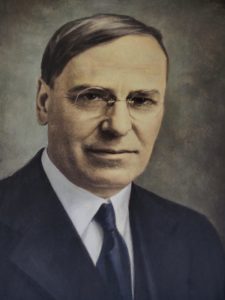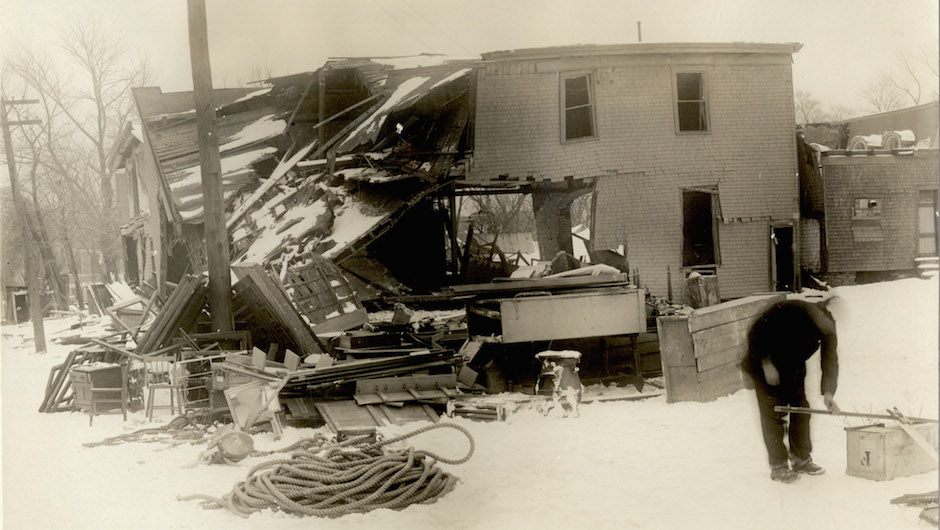FYP Letters is a series of non-curricular notes to keep us in touch over the next days and weeks. They are a combination of original writings and archival ones, including some re-printed FYP News items. — Dr. Susan Dodd, Interim FYP Director.
Dear FYP Student,
This awful catastrophe is not the end but the beginning. History does not end so. It is the way its chapters open.
This epigraph from Saint Augustine are the words with which Samuel Henry Prince–the remarkable figure for whom our dining hall is named–begins his ground-breaking work Catastrophe and Social Change: based upon a sociological study of the Halifax disaster (Columbia University Press, 1920).
Prince Hall is a favourite gathering place on campus. It’s easy to love the tall windows, the sometimes-working clock over the door, and the incredibly kind people who keep the room clean and the food fresh.

Samuel H. Prince
Prince is the first sociologist of disaster. He wrote Catastrophe and Social Change as his doctoral study and published it in 1920 with Columbia University Press, a full thirty years before “disaster studies” became a sub-discipline of sociology. Prince’s book is a study of the aftermath of the Halifax Explosion.To mark the 100th anniversary of that catastrophe, I wrote a commentary of Prince’s book in part because it is a beautifully written, complex and problematic text and in part because I, too, have done some work on catastrophes and the ways they can bring out the worst and best kinds of social change.
Prince was a phenomenal man, one of those towering figures that makes one cringe about one’s failure to contribute to the good of the world. And he is a complicated figure: a devout Anglican priest, he was one of the most powerful contributors to the secularization and bureaucratization of charity in Canada. (For more on Prince’s biography and its relation to King’s, check out Dr. Henry Roper’s work). Prince was a stalwart member of the King’s chapel community, a moving preacher (he wrote anonymous news reports of his own sermons that got printed in the New York Times), the founding Director of the Maritime School of Social Work, a King’s residence don for decades, a professor at universities across the city where he taught sociology, economics, politics, theology and social work, and a tireless activist against poverty, racism and systemic violence.
When our time together in FYP was so rudely interrupted by the pandemic, we entered into a time when Prince and his legacy to us became undeniably relevant. In Catastrophe and Social Change Prince describes the way the old social order of Halifax was literally blown into indeterminacy by the explosion. Then he describes the steps by which a new, more “rational” as he saw it, more “progressive”, more “modern” social order was created out of the ruins of the old stodgy Halifax.
“The Explosion blew Halifax into the 20th century” Prince repeated for the rest of his life.
He also said, over and over, that “catastrophe always means social change. There is not always progress.”

Damage caused by the explosion.
Prince describes what he presents as the reduction of the Halifax community into an “agglomeration” of individuals—a kind of free-floating mass of undifferentiated humanity in desperate need of re-organization, and re-stratification. The explosion revealed the weakness and corruption of the old city and created a blank space that called forth new forms of authority. This was a perilous moment.
One of my favourite things that perplexes Prince is that some of the most organized and effective first-responders were a troupe of actors. Prince attributes their fast-reorganization from an entertainment group into a makeshift first aid team to their self-discipline as a group on stage combined with their capacity to improvise…working together in unexpected ways.
For Prince, the exploded city needed to pass through authoritarianism before it could be trusted with rational self-government. In this regard, Prince argues that Halifax was lucky because we had authoritative help from social scientific experts from Boston, economic support from the federal government (Halifax was the Prime Minister’s home constituency), and strong local political leadership.
This sense that the catastrophe throws a community back into a kind of pre-reflective state where debate is something we cannot afford is a dangerous possibility in any catastrophic situation: once authoritarians gain control, they like to keep it…
And this is precisely why taking time to focus your thinking and develop your writing skills matters so much… so that you might become independent journalists and an unimaginable array of creative and critical agents through your continuing humanities studies. (For a daily update on the pandemic that is grounded in facts, not sensationalist, and at the same time frankly admits that it comes from a particular local and political perspective, please check out this website by an independent journalist and one of my best friends from my year in FYP–Mary Campbell of the Cape Breton Spectator.)
Here is Prince’s book in pdf from Project Gutenberg. And here’s a piece I did for the King’s website a year ago that celebrates the restoration of the King’s scholarship for African Nova Scotians that had been established in Samuel H. Prince’s honour.

